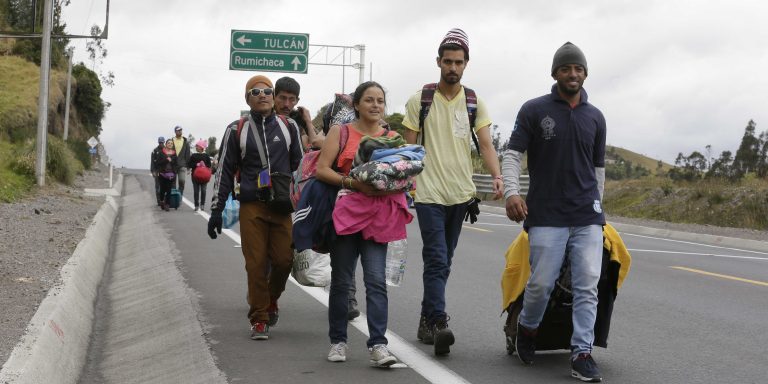INTELBRIEF
September 20, 2018
IntelBrief: Venezuela Teetering on the Brink

- According to the United Nations, approximately 2.3 million Venezuelans have fled their country over the last several years.
- Extreme shortages of food and medicine, coupled with hyper-inflation that could approach one million percent, are pushing Venezuelans to flee to neighboring Ecuador, Colombia, and elsewhere.
- There are no real prospects for positive change in the foreseeable future, with the Maduro government beginning its second term by simply blaming the U.S. and Europe for the country’s problems.
- As with Syria, the refugee crisis is a humanitarian nightmare as well as a destabilizing force, leading to calls of military intervention.
.
On September 14, 2018, the Secretary-General of the Organization of American States (OAS), Luis Almagro, visited a border crossing between Colombia and Venezuela and delivered an unusual warning when speaking about options to address the long-running crisis in Venezuela. He stated that, ‘with respect to a military intervention to overthrow Nicolas Maduro’s regime, I don’t think any option should be ruled out.’ Such blatant calls for regime change are rare. And while the prospects of foreign military intervention are remote, they are now openly discussed by senior officials in the U.S. and elsewhere. A failed assassination attempt against Maduro in July using drones equipped with explosives furthered the paranoia of the regime and fed into a host of conspiracy theories about who might have been behind the plot. Almagro’s commentsare further proof of the growing concern and frustration over the long-running collapse of oil-rich Venezuela. Relations between Washington and Caracas have been abysmal for years—from the Hugo Chavez era up to now.
In June 2018, the United Nations estimated that perhaps 2.3 million people had fled Venezuela over the last several years, with many going to Colombia, Ecuador, and other neighboring countries. The Colombian border city of Cucuta is ground zero for the refugee crisis, with several thousand desperate Venezuelans arriving daily. In the Brazilian town ofBoa Vista,refugees are housed in temporary shelters that, despite the obvious hardships, offer more safety and shelter than life in Venezuela. Having accepted large numbers of fleeing Venezuelans, Colombia, Peru, Ecuador, and other countries in the region are hardening their borders by tightening requirements for entry, requiring paperwork that many are unable to obtain from the Maduro government. In August, the government in Bogota said there were more than 870,000 Venezuelans in Colombia seeking refuge.
The crisis within Venezuela, and the spillover effects it is causing throughout the region, show no signs of improvement. Most scholars and analysts observing the situation expect it to deteriorate further over the next few months. The International Monetary Fund (IMF) stated that Venezuela could eventually experience rates of inflation over 1,000,000,000%. President Maduro tried to address the danger posed by hyper-inflation by issuing a new currency, although it was immediately dismissed as a counterproductive move. The national currency of bolívars was being traded on the black market at 14 million to one U.S. dollar after the announcement in August of a new ‘petro’ bolívar that devalued the old currency by 90%. The country is expected to experience an 18% decrease in Gross Domestic Product (GDP), the third year of crushing double-digit decreases in the country’s total economic output, after being adjusted for inflation.
The worsening situation continues to generate pressure on regional politicians to ‘do something’ though what that ‘something’ might be remains unclear. U.S. President Trump created some unease when he obliquely referenced the prospects of a U.S. military intervention in Venezuela. Latin American countries have justifiable anger and bitter memories over U.S. interventions in their countries, excursions which were often launched to install or support authoritarian regimes. There are no easy answers for Venezuela or its neighbors. Yet, enacting sanctions against a failing state could reinforce the narrative that Venezuela is suffering because it is being unfairly targeted for its socialist leanings. As bad as the current refugee outflow is for other countries, the human consequences will likely be worse, with an increasing number of Venezuelans giving up hope in the home country and seeking some semblance of safety and opportunity elsewhere.
.
For tailored research and analysis, please contact: info@thesoufancenter.org
[video width="960" height="540" mp4="https://thesoufancenter.org/wp-content/uploads/2018/09/ib-0920.mp4" poster="https://thesoufancenter.org/wp-content/uploads/2018/09/AP_18231679193371.jpg"][/video]